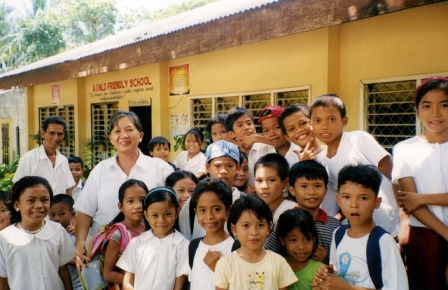With a warm, tropical climate and easy-going, friendly people, the Philippines is one of the countries in South East Asia that has seen a steady increase of tourists with each passing year. Most visitors have been to the country several times, and a lot of them have considered relocating to the country on a permanent basis. Foreigners travel to the Philippines to experience a quality night life, enjoy the picturesque beaches and great food. But apart from these, there are many other reasons why they choose to stay for good.

- Visas and Immigration
Prospective expats intending to work in the Philippines for less than six months will be required to apply for a special work permit. For periods exceeding six months, you will need to apply for a Philippines work permit from the embassy in your home country. All expats intending to work will need to have a sponsor in the Philippines and the offer of employment must be confirmed via a letter of request along with an affidavit of support which acts as a guarantee.
In addition, you should also have supporting documentation such as a valid passport and an Alien Employment Permit, which is an identification card which can be obtained by applying for one at the Department of Labor and Employments. If your family will be coming with you, you should also see to it that they have the necessary documentation before your flight.
- Culture
The Filipino people are known for their hospitality, friendliness, and easy-going nature. They are also extremely tolerant of foreigners and of other cultures, so if you come to the country sporting a Mohawk or facial piercings, expect some double takes, but there won’t be any overt staring or any signs of hostility coming from the locals. People will also be eager to accommodate or assist you, and most of them will go out of their way to lead you to the right hotel, mall, or wherever your destination may be. The Philippines is also more attuned to the Western world than any other South East Asian countries, and you will find that it’s easy to get around and start a conversation with somebody because almost everyone can speak English. Even those who are not very fluent will find a way to communicate with you and will try to help you in the best way they can.
Filipinos are very closely-knit, with family being a top priority for many of them. A lot of Filipino families like to spend time together on a weekly basis, so on the weekends, the malls are filled with people bonding with their immediate and extended families in the arcade, food court, or restaurants. Because the concept of togetherness is very important for many Filipinos, most of them choose to stay with their parents even after they’re married—not because it’s more convenient, but because they genuinely love to stay together under one roof. Sending elderly parents to live in a home for senior citizens is unheard of, and is considered to be a cruel or heartless act. In the Philippines, the elderly are cared for by their children, and their opinions and advices are highly sought after by the young.

Filipinos are usually very laid back, and this attitude can be both a delight and a source of frustration, as the same laid back approach can also be seen in offices or government organizations, so transactions usually go through at a glacial pace. Of course, this is not the case in all places, but if you happen to find yourself waiting for a particular service or product, it’s best not to get mad and accept that it may take a while, so have patience and keep your cool.
- Language and Religion
There are two main languages that are spoken in the Philippines. The mother tongue is called Tagalog, which has elements from Malaysian, Chinese, and Spanish language. The other language that is widely spoken is English. Other dialects are spoken in other regions of the country, such as Ilocano, Kapampangan, Bicolano, Cebuano, and Ilonggo, among many others.
The Philippines is mostly a Catholic country, with more than 80 percent of the population being Roman Catholics, 4.5 percent Christian, 2.3 percent Iglesia ni Cristo, 5 percent Moslem, and the others are Evangelical and Aglipayan.
- Climate and Weather
The climate in the Philippines is mostly tropical, with high levels of humidity, and temperatures remain high through most of the year. The coolest months of the year are from December to February, while the warmest months are from March to May when temperatures can reach up to36 degrees. Expats from Europe may experience some discomfort upon arriving in the Philippines because of the constant humidity, and it will take some time to get adjusted to the heat.

- Health Care
The standard of healthcare in the Philippines varies according to region, but in major cities, the facilities in hospitals and clinics are usually very good. In Metro Manila, there are some medical centers that offer excellent healthcare facilities such as the Asian Hospital in Alabang, Saint Luke’s Hospital in Bonifacio Global City, Makati Medical Center in Makati, and Medical City in Ortigas.
The medical practitioners are very qualified and many are fluent in English. Some have even studied in the UK, USA, and in other parts of Europe. Healthcare services in the Philippines have greatly improved over the past decade, and most expats take out a health insurance from leading insurance companies.
- Education
The education system in the Philippines has undergone some major changes over the past two years. Since the late 1940’s, children usually start going to school at the age of four, and at age seven they enter elementary school for seven years. This is followed by a secondary education which lasts for four years. On their fourth year, students may take entrance examinations to the colleges or universities of their choice. This has always been the way it was for education, until government officials pointed out that the youth could be missing out on employment and learning opportunities because of this outdated learning structure.

Stay tuned for Part Two of this article!

Before moving to the Philippines, it’s crucial to understand the local climate, which is tropical and can be hot and humid year-round. Familiarize yourself with the cost of living, which varies greatly between urban areas like Manila and more rural regions. Learn about the healthcare system and consider health insurance options, as quality can vary. Understanding cultural norms and language, with Filipino and English being widely spoken, will help you integrate smoothly. Lastly, be aware of visa requirements and residency regulations to ensure a hassle-free transition. For information on visa-related appointments and requirements, visit https://nbi-appointment.com/.
Moving to the Philippines is an exciting opportunity, but preparation is key. Familiarize yourself with the local culture, consider health insurance, and learn some Tagalog to ease communication. Research the cost of living, stay informed about safety, and for managing documentation, use https://dfaonlineappointment.com/ to streamline the process. With the right preparation, you can fully enjoy your new life in this vibrant country!